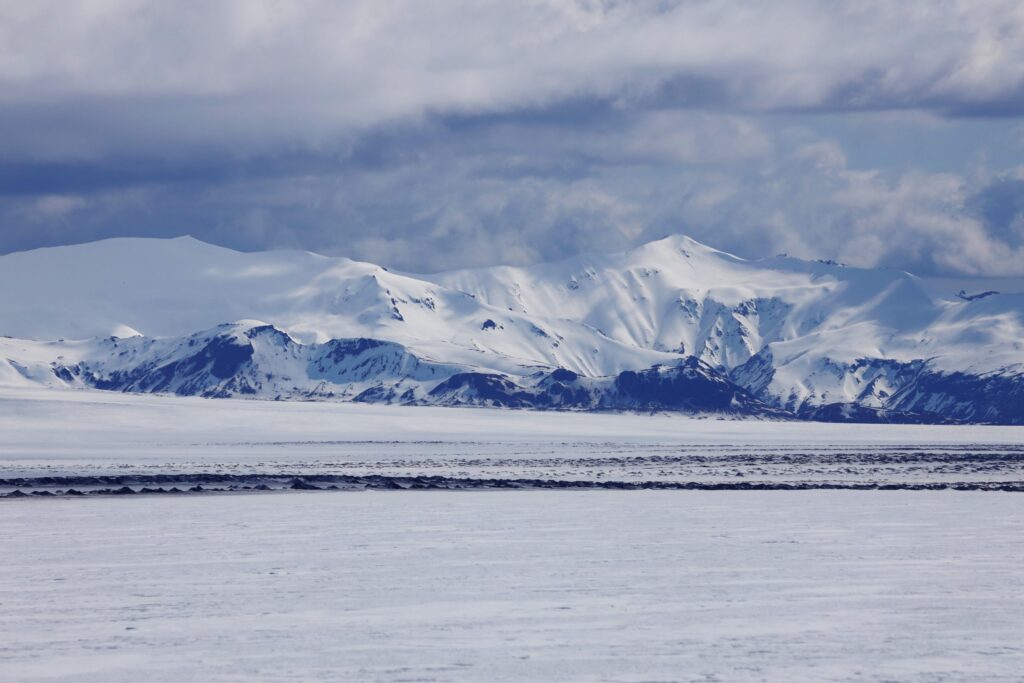A region of cooling water in the North Atlantic Ocean, located south of Iceland and Greenland, has likely slowed the melting of glaciers since 2011 and may continue to stymie ice loss until 2050, according to researchers.
Nicknamed the ‘Blue Blob,’ the cold patch was most prominent during the winter of 2014-2015 when the sea surface temperature was about 1.4°C (2.52°F) colder than normal, although the origin and cause of the patch is still being investigated.
A new study used climate models and field observations to show that the cold water patch chilled the air over Iceland sufficiently to slow ice loss starting in 2011. The model predicts cooler water will persist in the North Atlantic, sparing Iceland’s glaciers until about 2050. Ocean and air temperatures are predicted to increase between 2050 and 2100, leading to accelerated melting.
While cooler water in the North Atlantic offers a temporary respite for Iceland’s glaciers, the authors estimate that without steps to mitigate climate change, the glaciers could lose a third of their current ice volume by 2100 and be gone by 2300. If the country’s 3,400km3 (about 816 cubic miles) of ice melt, sea level will rise by 9mm (0.35in).
Brice Noël, lead author and a climate modeler who specializes in polar ice sheets and glaciers at Utrecht University, said, “In the end, the message is still clear. The Arctic is warming fast. If we wish to see glaciers in Iceland, then we have to curb the warming.
“It’s crucial to have an idea of the possible feedbacks in the Arctic because it’s a region that is changing so fast. It’s important to know what we can expect in a future warmer climate,” he said.
The warming Arctic
Recent studies report that the Arctic is warming four times faster than the global average. Iceland’s glaciers steadily shrank from 1995 to 2010, losing an average of 11 gigatons of ice per year. Starting in 2011, however, the speed of Iceland’s melting slowed, resulting in about half as much ice loss. This trend was not seen in nearby, larger glaciers across Greenland and Svalbard.
Noël and his colleagues investigated the cause of this slowdown by estimating the glaciers’ mass balance — how much they grew or melted annually from 1958 to 2019. They used a high-resolution regional climate model that works at the small scale of Iceland’s glaciers to estimate how much snow the glaciers received in winter and how much ice was lost from meltwater runoff in summer. The researchers found that cooler waters near the Blue Blob are linked to observations of lower air temperatures over Iceland’s glaciers and coincide with the slowdown of glacial melting since 2011.
Several researchers have proposed that the Blue Blob is part of the normal sea surface temperature variability in the Arctic. Notably, especially cold winters in 2014 and 2015 led to record cooling, which caused upwelling of cold, deep water, even as ocean temperatures around the region warmed due to climate change.
Before the Blue Blob, a long-term cooling trend in the same region, called the Atlantic Warming Hole, reduced sea surface temperatures by about 0.4°C to 0.8°C (0.72°F to 1.44°F) during the last century and may continue to cool the region in the future. A possible explanation for the Warming Hole is that climate change has slowed the Atlantic Meridional Overturning Circulation, an ocean current that brings warm water up from the tropics to the Arctic, thus reducing the amount of heat delivered to the region.
Iceland’s glaciers
Noël projected the future climate of Iceland by combining the same regional climate model with a global climate model to predict how North Atlantic ocean temperatures would affect the glaciers’ fate until 2100, under a scenario of rapid warming. The models predicted that the North Atlantic near Iceland will stay cool, slowing, and perhaps even temporarily stopping, ice loss from the glaciers by the mid-2050s.
The authors verified that the models accurately reconstructed the mass of the glaciers using almost 1,200 measurements of snow depth collected between 1991 and 2019 by colleagues at the University of Iceland, and satellite measurements of the elevation and extent of glaciers taken from 2002 to 2019 by co-authors at the Delft University of Technology.
To view the complete paper published in the AGU journal Geophysical Research Letters, click here.



